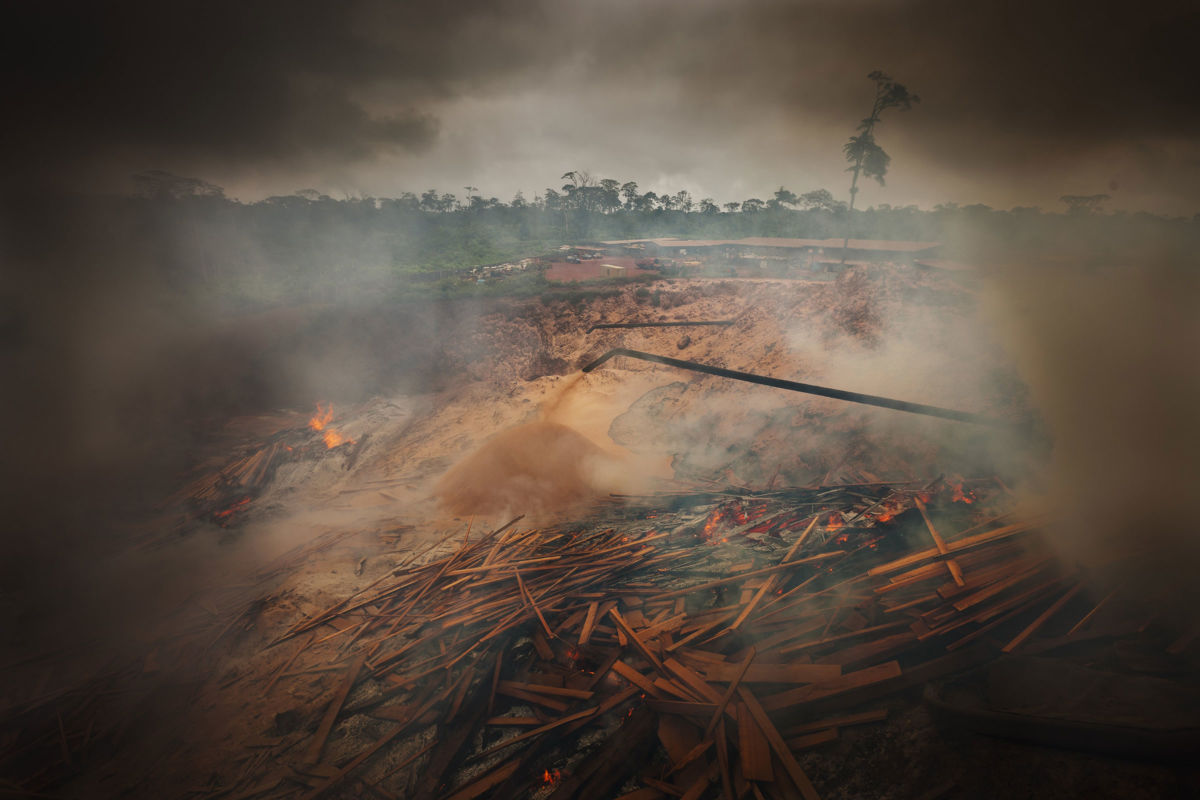Did you know that Truthout is a nonprofit and independently funded by readers like you? If you value what we do, please support our work with a donation.
Fires in the Amazon have sparked debate around the world, amplifying fears of climate change and the dire threat they pose for local Indigenous communities and the future sustainability of the planet.
These concerns are valid and real. Policies introduced by Brazilian President Jair Bolsonaro are widely recognized to have put the future of the Amazon rainforest in jeopardy.
The Amazon generates about half of its own rainfall by recycling rainfall moisture as air mass moves from the Atlantic to the west. Research shows that deforestation must be checked and reversed in the Amazon by reducing the deforested area to less than 20 percent to avoid the tipping point for deforestation-generated degradation of the hydrological cycle.
As the story about the Amazon fires unfolds, attention has also turned to fires raging in Europe and Africa, including in the Congo Basin, the second-largest tropical rainforest in the world, covering an area about the size of Mexico.
The basin contains the largest undisturbed tract of tropical rainforests and peatlands in the world. Fire and infrastructure changes could pose a serious threat to this ecosystem and stymie efforts to achieve global emissions targets aimed at limiting global temperature increases to 1.5 degrees Celsius.
Known as the Cuvette Centrale, the Congo peatland, which is estimated to hold about 30 gigatons of carbon — equivalent to 15 to 20 years of U.S. emissions — was mapped not so long ago by an international team of scientists, and its characteristics were detailed in a report. Now, collaborations are being formed in an effort to ensure its protection as a carbon sink.
Last year, a landmark agreement was signed by the Republic of Congo, the Democratic Republic of Congo and Indonesia intended as a basis for cooperation on sustainable agriculture, logging, and oil and gas extraction projects in the Cuvette.
Another agreement for the exchange of management strategies for tropical peatlands is also centered on south-south cooperation through the International Tropical Peatland Center. Headquartered at my organization, the Center for International Forestry Research (CIFOR), the alliance includes Indonesia, Peru, the Republic of Congo and the Democratic Republic of Congo.
The peatlands facility at CIFOR was partly inspired by enormous fires in Indonesia in 2015, which burned uncontrollably for long periods due to dry conditions. The related peat fires and haze in Indonesia had severe consequences: The fires killed as many as 100,000 people, led to half-a-million hospitalizations and caused billions of dollars in damage.
After the 2015 fires, Indonesia also subsequently launched a new interactive Peatland Restoration Information and Monitoring System designed to support transparency and complex restoration initiatives to complement the country’s moratorium on palm oil plantations. In 2011, the Indonesian government announced a moratorium on the conversion of primary forest and peatlands more than three meters deep. In 2016, the moratorium was extended to cover all peatlands.
The value of peatland ecosystems must not be underestimated. They are rich in carbon because they are made up of layers of decomposed organic material built up over thousands of years. Vulnerability to fire — which can burn for years in peat — and other threats increase as peatlands are drained for agricultural or other purposes. Resulting land degradation leads to greater susceptibility to land subsidence, flooding and erosion.
Worldwide, peatlands face threats from agricultural, forestry and development activities, which often leads to drainage and burning believed to cause up to 5 percent of annual carbon dioxide emissions. They make up only 3 percent of the world’s landmass, but contain as much carbon as all terrestrial biomass and twice as much as all forest biomass.
Although fires can ignite naturally in the dry season, some are set intentionally by farmers to clear their land and improve crop yields. Some of these fires can also burn out of control.
Fires and droughts have the potential to become obstacles for achieving nature-based solutions to the climate crisis. Fire can wipe out years of forest management efforts in a short time. Peatlands in the Congo Basin and elsewhere must be kept wet or re-wet to offset the potential for fire and as part of landscape restoration efforts.
Governments must unite to develop policies to protect biodiversity, secure carbon storage and reduce greenhouse gas emissions that cause global warming.
It is clear that we must put a global focus on forest fire management. We need more affirmative action based on evidence generated by research to back the creation of solid international guidelines and a recognized body to coordinate efforts.
A terrifying moment. We appeal for your support.
In the last weeks, we have witnessed an authoritarian assault on communities in Minnesota and across the nation.
The need for truthful, grassroots reporting is urgent at this cataclysmic historical moment. Yet, Trump-aligned billionaires and other allies have taken over many legacy media outlets — the culmination of a decades-long campaign to place control of the narrative into the hands of the political right.
We refuse to let Trump’s blatant propaganda machine go unchecked. Untethered to corporate ownership or advertisers, Truthout remains fearless in our reporting and our determination to use journalism as a tool for justice.
But we need your help just to fund our basic expenses. Over 80 percent of Truthout’s funding comes from small individual donations from our community of readers, and over a third of our total budget is supported by recurring monthly donors.
Truthout has launched a fundraiser to add 340 new monthly donors in the next 5 days. Whether you can make a small monthly donation or a larger one-time gift, Truthout only works with your support.
